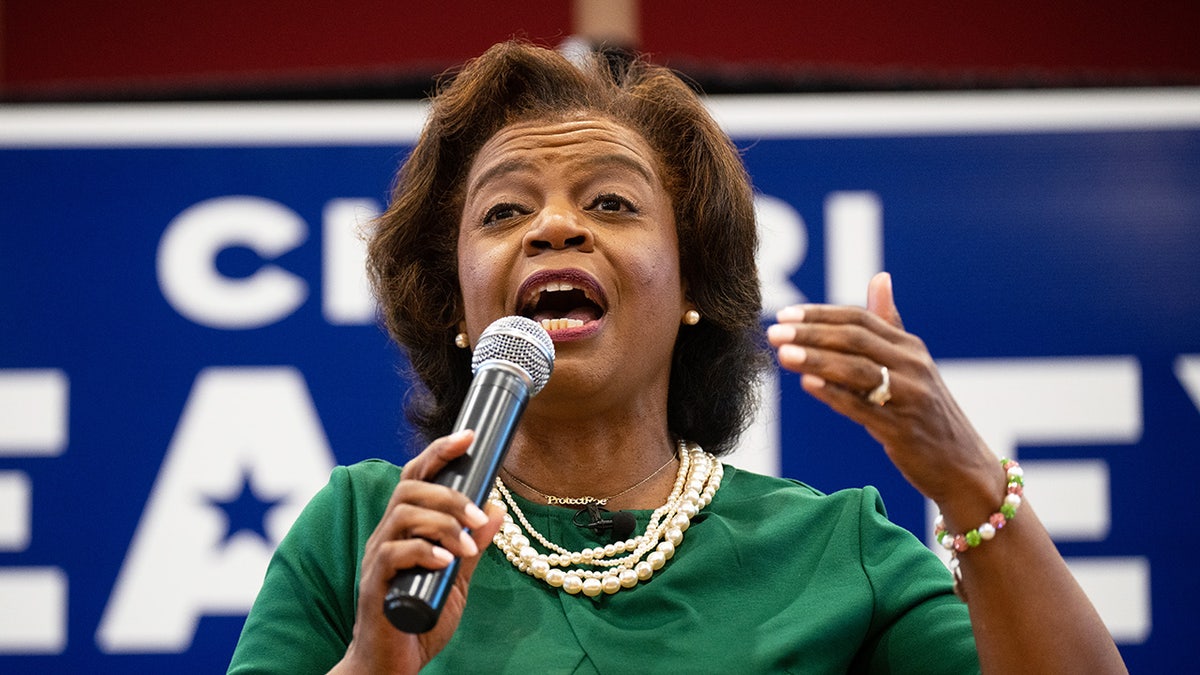Fox News Flash top headlines for November 3
Fox News Flash top headlines are here. Check out what's clicking on Foxnews.com.
North Carolina’s statewide elections are generally closely divided affairs, but Democrats have failed to win a U.S Senate race since 2008. Party officials were encouraged that the streak could be broken this year when former state Supreme Court Chief Justice Cheri Beasley got in the race last year.
The primary field was cleared for Beasley, who would be North Carolina’s first Black senator if elected, and she’s been the top fundraiser throughout the campaign. But Republican three-term Rep. Ted Budd has benefited from the Senate endorsement of former President Donald Trump and tens of millions of dollars in outside spending for ads attacking Beasley.
The Senate Leadership Fund had spent close to $30 million against Beasley by the campaign’s final weeks. Beasley and her allies have criticized Budd on his anti-abortion views and for his votes against bills related to controlling health care costs. Budd’s camp has attacked Beasley for supporting President Joe Biden’s policies and for her written opinions while on the state Supreme Court that they say were weak on crime.
Republicans currently hold eight of the 13 U.S. House seats, with North Carolina gaining a 14th seat based on census figures. Redistricting litigation ultimately put Democrats in a strong position to win six U.S. House seats, with a chance to reach parity with the GOP in a new open Raleigh-area district considered a toss-up. This race pits Democratic state Sen. Wiley Nickel against Republican Bo Hines, also endorsed by Trump.
The GOP has controlled the General Assembly since 2011 but hasn't held veto-proof majorities since 2018, which has allowed Democratic Gov. Roy Cooper to block what he considers extreme Republican policies on guns, abortion and immigration. But Republicans need only two additional Senate seats and three House seats to overcome his vetoes. Cooper and other Democrats contend Republicans will severely restrict or prohibit abortion in light of the U.S. Supreme Court decision in June overturning Roe v. Wade. GOP legislative leaders say there’s no consensus on abortion changes and have focused their campaigns on the economy and state tax cuts they approved.
FORMER VP MIKE PENCE VISITS NORTH CAROLINA TO SUPPORT GOP SENATE CANDIDATE TED BUDD
The outcome of the two state Supreme Court races could have a lot to say about whether abortion restrictions or challenged Republican policies will be upheld. Democrats currently hold a 4-3 seat advantage. Republicans need to win one of the two to take back a majority they last held in 2016.
Here’s a look at what to expect on election night:
ELECTION NIGHT
Polls close at 7:30 p.m. local time (ET).
HOW NORTH CAROLINA VOTES
The vast majority of North Carolina voters (nearly 84% in the 2020 presidential election) cast absentee ballots. And most of those are in-person votes. Mail-in absentee ballots accounted for 18% of the total vote for president in 2020.
The most populous counties — Wake (home to the state capital, Raleigh), Mecklenburg (Charlotte) and Guilford (Greensboro) — vote heavily Democratic. North Carolina’s rural counties skew overwhelmingly Republican. To win statewide office, Republicans need to limit their losses in the cities and do well in the suburbs.
DECISION NOTES
AP will tabulate and declare winners in 139 contested elections in North Carolina, including one U.S. Senate seat, 14 U.S. House races and six statewide judicial races. In the 2020 general election, AP first reported results at 7:42 p.m. ET and 90% of the results at 11:35 ET on election night, Nov. 3, 2020.

U.S. Senate candidate Cheri Beasley of North Carolina speaks during her campaign rally on Oct. 15, 2022. (Bill Clark/CQ-Roll Call, Inc via Getty Images)
AP does not make projections or name apparent or likely winners. Only when AP is fully confident a race has been won – defined most simply as the moment a trailing candidate no longer has a path to victory – will we make a call. Should a candidate declare victory – or offer a concession – before AP calls a race, we will cover newsworthy developments in our reporting. In doing so, we will make clear that AP has not yet declared a winner and explain the reason why we believe the race is too early or too close to call.
The AP may call a statewide or U.S. House race in which the margin between the top two candidates is 0.5% or less, if we determine the lead is too large for a recount to change the outcome.
The AP will not call down-ballot races on election night if the margin between the top two candidates is less than 2% or if the leading candidate is within 2% of the 50% runoff threshold. AP will revisit those races later in the week to confirm there aren’t enough outstanding votes left to count that could change the outcome.
WHAT ELSE SHOULD I KNOW?
Q: WHAT DID WE LEARN FROM THE PRIMARY?
A: President Donald Trump’s endorsement still means a great deal in the Tar Heel state. Budd was little known outside Washington or his central North Carolina congressional district when he entered the Senate race in spring 2021. At the time. former Gov. Pat McCrory was considered the GOP primary front-runner. But Trump’s announcement in June 2021 endorsing Budd and indirectly disparaging McCrory was the game-changer over time. Budd ultimately beat McCrory in the May primary by 34 percentage points. Trump’s support has remained a key element of Budd’s strategy.
Q: WHAT’S CHANGED SINCE THE PANDEMIC ELECTION OF 2020?
A: After the 2020 Census showed an increase in its population, North Carolina gained one more seat in the U.S. House of Representatives, giving it 14.
3 YOUNG PEOPLE INJURED IN NORTH CAROLINA SHOOTING ON HALLOWEEN NIGHT
Q: WHAT DO TURNOUT AND ADVANCE VOTE LOOK LIKE?
A: As of Oct. 15, 7.4 million North Carolinians were registered to vote. Nearly 34% were registered Democrats and 30% Republicans. Two weeks before the election, the advance vote was running at 19% of 2018 advance vote.
Q: HOW LONG DOES COUNTING USUALLY TAKE?
A: North Carolina counts ballots very quickly, partly because so many votes have come in before Election Day. In 2020, 99% of votes were counted on Election Day.
CLICK HERE TO GET THE FOX NEWS APP
Q: WHAT HAPPENS AFTER TUESDAY?
A: North Carolina allows candidates to request a recount in close races. The threshold is a 0.5% margin or 10,000 votes (whichever is less) for statewide races and 1% of total votes for non-statewide races. The state covers the cost of recounts.














































